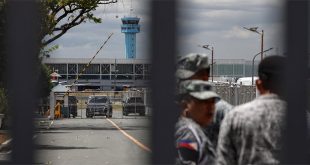
Ottawa, Canada | Xinhua | Due to Russian airspace closure to carriers from close to 40 countries, flights have to be rerouted or canceled, with the most heavily impacted markets in Europe-Asia and Asia-North America, the International Air Transport Association (IATA) announced on Monday.
Publishing a factsheet and providing guidance on the economic impact of the sanctions and airspace closures, IATA’s research team said the most heavily hit include flights between the United States and Northeast Asia, and between Northern Europe and most of Asia. In 2021, RPKs (revenue passenger kilometers) flown between Asia-North America and Asia-Europe accounted for 3.0 percent and 4.5 percent of global international RPKs respectively, both below their shares prior to the pandemic, due to the slow international recovery in Asia.
In terms of air cargo, the Europe-Asia market represented 20.6 percent of all international CTKs (cargo ton kilometers) over the past 12 months. The Asia-North America trade lanes accounted for 26.7 percent of global international CTKs, and 2.2 percent within Europe (including Russia) over the same period. Flight bans and sanctions will cause a loss of capacity, especially affecting Europe-Asia and exacerbating the current capacity crunch. It is, however, possible that airlines in other parts of the world can fill the gap, such as the super-connector airlines in the Middle East.
Jet fuel prices had risen to 141 U.S. dollars per barrel on 4 March, up 27 percent over the month. Upward pressures on prices will continue, in particular if more stringent sanctions were to be applied to the Russian energy sector. All airlines that have some unhedged fuel demand will be directly impacted. Airlines may pass the higher fuel costs on passengers through higher air fares. At a time of already elevated inflation (5.8 percent for the all-items CPI in G7 countries in January), higher air fares could reduce demand for air travel.
Passenger demand for air travel will in all probability also be curtailed or delayed by mounting safety concerns, notably in countries neighboring Russia.
Air cargo rates are already close to record highs (120 percent above pre-crisis levels), and the rising jet fuel price combined with loss of capacity are likely to push rates even higher. As for passenger traffic, this could reduce demand.
Beyond air cargo, merchandise trade will be affected globally. Rail linking Asia and Europe through Russia could come to a halt, and the important Black Sea trade area is already mostly closed to maritime transport. Hence, already significant supply chain issues will likely be exacerbated and linger for longer, the factsheet revealed.
******
Xinhua
 The Independent Uganda: You get the Truth we Pay the Price
The Independent Uganda: You get the Truth we Pay the Price


